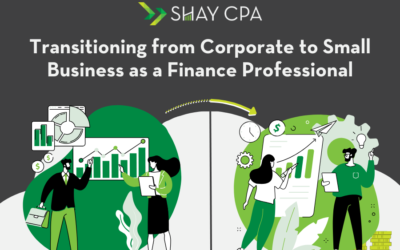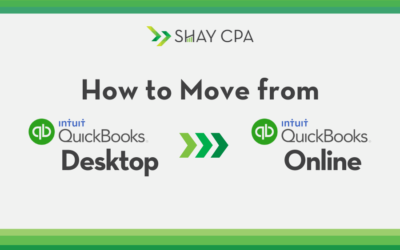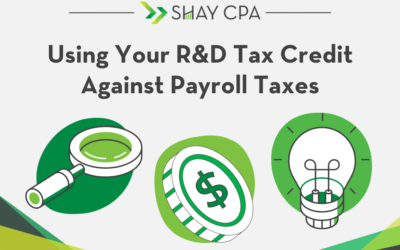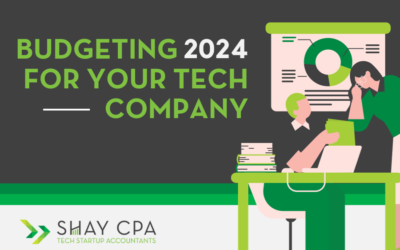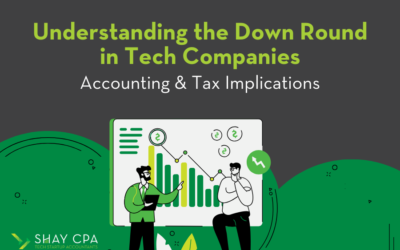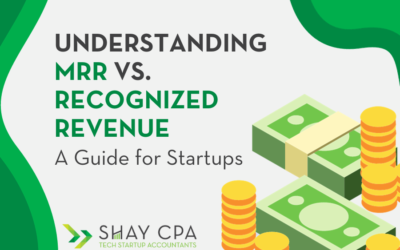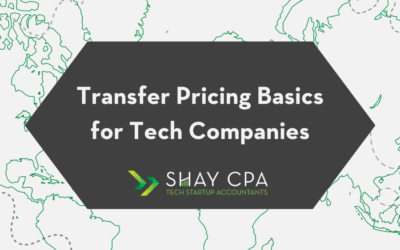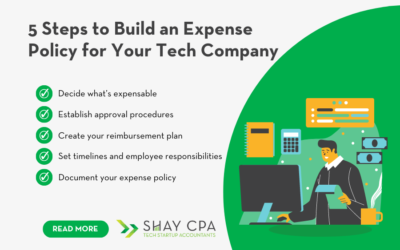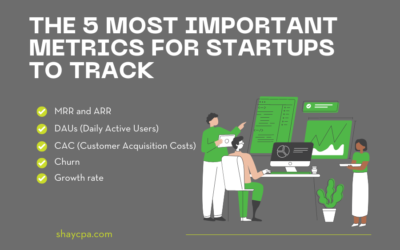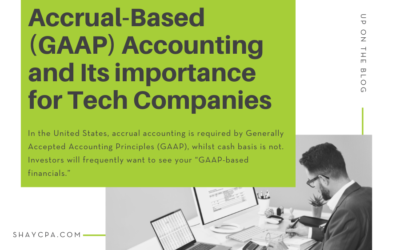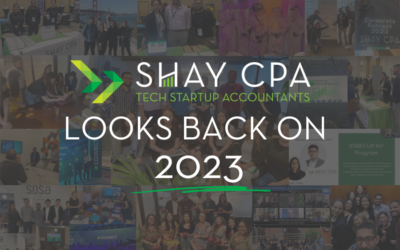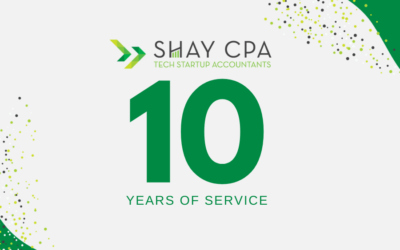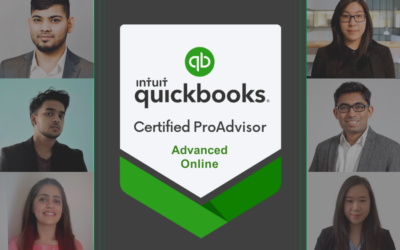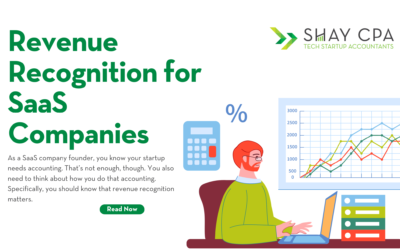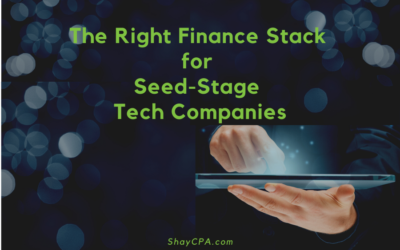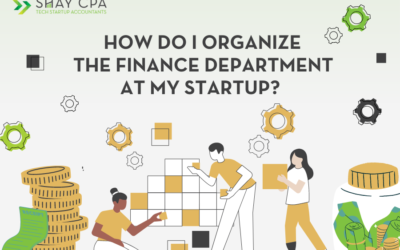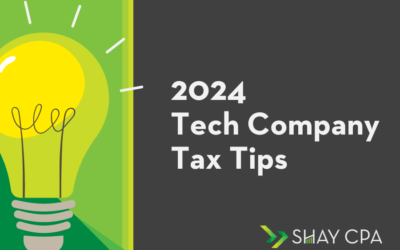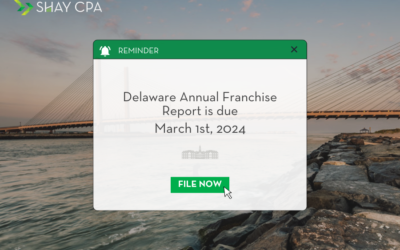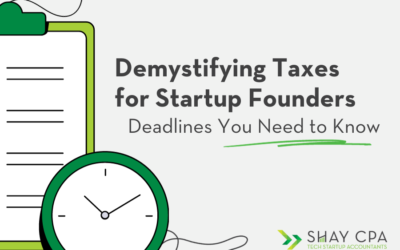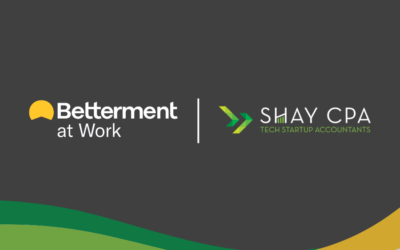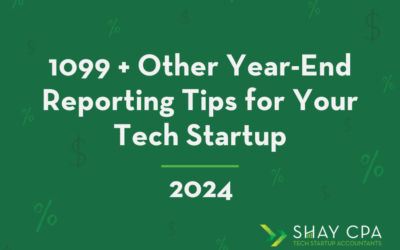Transitioning from Corporate to Small Business as a Finance Professional
While working in the corporate world provides some serious upside — from the chance to learn from a wide range of people to cushy compensation packages — it can also be a grind. And as the recent wave of tech layoffs continues crashing upon people, you might be...
R&D Credits for AI/ML Companies
If your company is leaning into the exploding opportunities created by artificial intelligence (AI) and machine learning (ML), you’re probably excited about what it could do for your business. Lots of people and companies are champing at the bit for AI/ML products and...
How to Move from QuickBooks Desktop to QuickBooks Online
More and more finance teams are making the jump from QuickBooks Desktop to QuickBooks Online. And it’s not just because the online version maintains the user experience that you’re used to while allowing access from anywhere at any time. It’s because QuickBooks is in...
Refresh Your Finances: Spring Clean Your Bookkeeping to Prep for Your Next Fundraiser
‘Tis the season. As the days get longer and the weather gets warmer, it’s time to undertake the annual chore of spring cleaning. This doesn’t just apply to your abode. Employing a spring-cleaning mentality at your startup — especially when it comes to your books — can...
Exploring Different Types of Equity Grants
When you’re growing a business in its early phases, you’re usually anything but liquid. Not so very long ago, that presented a huge problem for founders. Did they burn through runway to offer competitive pay so they could lure the best employees? Or did they play it...
Our 3 Top Accounting Trends for 2024
2024 is already well underway, but we’re definitely still early enough into the year that it could go any direction. To help our team and clients prepare for what this year will bring, we’ve spent some time thinking about changes coming down the pipe. As we zoomed...
A Founder’s Guide to Efficient Financial Management in 2024
No matter what kind of solution, service, or product a company delivers, it has one thing in common with every other business in existence today. What’s that underlying thread? They all need to be on top of their financial management. Sure, when you’re small and...
Using Your R&D Tax Credit Against Payroll Taxes
As you wrapped up the 2023 books for your startup, you probably did some high-level financial review and analysis. Looking over key documents like your profit and loss statement, you get a better idea of what’s driving revenue — and where you’re spending. For most...
Tax Season 2024- Get Your Books Ready in 6 Steps
The start of a new year always feels fresh. You’re looking ahead and probably getting excited about everything your startup will accomplish in 2024. Don’t forget to look behind you, though. Even as you vision-cast for the year ahead, you need to wrap up the year...
How to Move from QuickBooks Desktop to QuickBooks Online
More and more finance teams are making the jump from QuickBooks Desktop to QuickBooks Online. And it’s not just because the online version maintains the user experience that you’re used to while allowing access from anywhere at any time. It’s because QuickBooks is in...
Our 3 Top Accounting Trends for 2024
2024 is already well underway, but we’re definitely still early enough into the year that it could go any direction. To help our team and clients prepare for what this year will bring, we’ve spent some time thinking about changes coming down the pipe. As we zoomed...
Staying Ahead of 2024: Essential Accounting Tips for Founders
The new year is already well underway. That doesn’t mean it’s too late to start implementing some new best practices for 2024, though. When it comes to your accounting, employing a few tools and keeping key facts in mind can make your life a whole lot easier. That’s...
Budgeting for 2024 for Your Tech Company
Think back to the earliest days of your startup. What started off as nothing more than an idea bloomed into a company. How did that happen? To a large extent, you can probably chalk it up to careful planning followed by diligent execution. With the new year about to...
Understanding the Down Round in Tech Companies: Accounting & Tax Implications
Going through a down round isn’t ideal, but plenty of startups have successfully leveraged one — or several — on their way to success. Whether you’re considering this option because of internal factors (like lackluster financial performance) or external ones (like...
Understanding MRR vs. Recognized Revenue: A Guide for Startups
If you’re running a subscription-based business, you’ve probably already started exploring ways to measure your recurring revenue. When you track your recurring revenue with a metric like monthly recurring revenue (MRR), you get a way to keep a finger on the pulse of...
How to Safely Use ChatGPT for Your Tech Company Accounting
For years, forward thinkers have been having conversations about how artificial intelligence (AI) has the potential to transform the way we live and work. But it wasn’t until ChatGPT exploded onto the scene that everyday people started to sit up and take notice. With...
Crunching the Numbers: Decoding the Right Time for a Financial Statement Audit
There's an adage that says, "The best time to plant a tree was 20 years ago. The second-best time is now." However, when it comes to financial statement audits, the timing isn't quite as forgiving as planting trees. Understanding the dynamics of your financial...
What are SAFE Agreements?
A relatively new tool has come into founders’ hands: simple agreements for future equity, or SAFEs. But are they, as the name suggests, simple? Not necessarily. They’re still worth wrapping your head around, though, because SAFEs could give you a way to get the...
A Founder’s Guide to Efficient Financial Management in 2024
No matter what kind of solution, service, or product a company delivers, it has one thing in common with every other business in existence today. What’s that underlying thread? They all need to be on top of their financial management. Sure, when you’re small and...
How CorpNet Helps Startups with State Compliance
Sometimes, running your business isn’t the hardest part of running your business. Instead, complying with state and federal regulations, from taxes to employer requirements, feels most burdensome. Fortunately, you can pay someone else to handle that for you. And...
Why Outsource Financial Services Rather Than Hire in House?
In 2023, it seems like you can outsource just about anything. You might pay a company to provide first-level customer support, or you might work with a marketing agency to develop and run campaigns. You might turn to a third-party provider for HR or website...
Shutting Down Your Tech Company? Here’s What You Need to Know
If you’ve run out of runway and you’re out of options, it might be time to hang up your hat. Don’t fling it onto that hat rack just yet, though. Before you can shut down a tech company (or any company, for that matter), you need to take certain steps. Failing to...
Hiring Employees and Contractors in the U.S. and Abroad: Tax Considerations & Software Solutions
A good team is the backbone of any thriving company. And the rise of technology has made it easier than ever before to expand your hiring pool well outside the boundaries of your city or even your state. Before you seek out the best and the brightest, though, make...
What’s the Difference Between a Controller and a CFO?
When your tech startup is young and scrappy, people wear a lot of hats. In fact, in its early days, you might have even overseen the company’s finances. As you grow, though, you want to bring in people with the required expertise to continue scaling successfully. And...
Transfer Pricing Basics for Tech Companies
As an early-stage tech company, expanding your operations overseas can provide access to new markets and tap into a global talent pool. However, hiring software developers and engineers in foreign countries requires having a transfer pricing agreement in place. ...
Cash Management: How to Manage Cash for Your Startup — and Why It Matters
You’ve probably heard it before: cash is the lifeblood of a business. You need it running through your company’s veins to keep things functioning. Without it, you’ll struggle to do core things like pay employees and maintain your office space, let alone market your...
5 Steps to Build an Expense Policy for Your Tech Company
Last summer, we talked about some best practices for a tech company’s expense policy. If you read it, it probably got your wheels turning. As it turns out, solid — and IRS-compliant — expense management means a lot more than cutting a check for the amount of the...
When and How to Raise a Series A
You’re past seed-stage funding, but unless your startup is particularly lucky, that doesn’t mean you’re past needing outside investing to continue your growth. Sure, some businesses can bootstrap. But if you’ve got a vision that you want to bring to life on any kind...
Protecting Your Funding: FDIC Insurance and Beyond
When you’re building your business, securing a new round of funding marks a huge milestone. But as a founder, you know what really matters is what happens next. How you handle that money shapes your business. It can literally make or break you. That means you’re...
What is a Fractional CFO?
A lot of pieces make up a successful startup: a great idea, an innovative team, willing investors — the list goes on. But at the end of the day, there’s one key component that can make or break everything else: your finances. The way your organization manages its...
The 5 Most Important Metrics for Startups to Track
Startup founders risk information overload. As you grow your team, you’ll probably get reports and updates on how various facets of your startup are faring. It’s a lot to take in. You might even reach a point where you start to miss the forest for the trees. It’s...
What is a 409A Valuation?
Once your startup goes public, any and everyone can see what you’re worth. But when you’re private, you still want to have a way to know where you’re valued. Fortunately, you don’t have to fly blindly here. You can get a 409A valuation. This valuation, which you...
Accrual-Based (GAAP) Accounting and Its importance for Tech Companies
Accounting can be more complicated than you expect. Even if you feel completely comfortable monitoring your personal finances, once you found a startup, there’s more to consider. Specifically, companies have to factor in accounts payable (AP) and accounts receivable...
Congrats you raised your Series A – Make your next hire- A FULL-TIME CFO!
With a Series A fundraise we see typical raise sizes in the range of $10M+. Being a good financial steward for that amount of money as a founder is a lot of responsibility and for that reason, I would encourage any Founder at this stage to make your next C-Suite hire...
Budgeting and Forecasting Tips for Your Tech Company
Running a tech company requires you to keep a lot of plates spinning. You might not feel like you have time for financial planning and analysis (FP&A) — but you need to make time. Without proper budgeting and forecasting in place, you’re flying blind. You need a...
What do VC’s look for in early-stage founders?
By: Kacie Goff Funding-wise, things generally get easier as your business grows and gains traction. It’s getting the funding you need to finance the early stages of your company that’s the trick. And that’s precisely what prevents a lot of good ideas from becoming...
Thank You to Our Clients, Partners, and Team
Over here at ShayCPA, we’ve grown and learned a lot over the course of 2023. As I look back, I have a lot of gratitude. This year, there were quite a few different highlights. We had some amazing accomplishments, including hitting our ten-year anniversary. And we’ve...
ShayCPA Looks Back on 2023
It’s been a busy year for our team — in the best possible way. We’ve had the opportunity to travel all around the country to participate in a handful of exciting events, from our own company retreat to industry favorites like TechCrunch Disrupt and QuickBooks...
✨ Celebrating a decade of excellence at Shay CPA! ✨
November 15th, 2013, was my last day at my full-time job at WNET-Channel 13. That day was a culmination of a three-year journey prior where I was moonlighting and creating my CPA firm on the side - nights, weekends, and even lunch hours. Leaving a full-time job was a...
ShayCPA’s 2nd Annual Retreat Recap: Uniting for Growth
We're excited to share the incredible experiences and moments from our 2nd Annual Company Retreat in New York City. Over three days, our team united for collaboration, gained insights, and enjoyed thrilling adventures that left us with unforgettable memories. Let's...
Insights from ShayCPA’s QBO ProAdvisor Certifications
Super proud of our team for completing their QBO ProAdvisor and Advanced ProAdvisor Certifications this week. Here are some takeaways from our training that can help our finance leaders in the technology space. Deferred Revenue: Deferred Revenue is finally...
Tech Day- Founders Summit 2022
SHAY CPA P.C. sponsored TechDay HQ's 2022 Founder's Summit event in NYC. TechDay HQ's Founder's Summit is a highly focused conference designed exclusively for startup founders and their c-suite executives. The conference featured educational sessions presented by...
2022 ShayCPA Quickbooks ProAdvisor Update
When it comes to picking an accounting system for your technology company, Quickbooks is a great place to start. ShayCPA’s team is Quickbooks Online Advanced Certified. What does that mean? Advanced Certification for the Quickbooks Online System requires our team to...
The Truth About Being a Tech Company Service Provider
As a CPA, I’ve been working with technology companies since 2010. It started out as something I did on the side, but it turned into a full-time business in late 2013. The tech industry is a unique animal, and I’ve learned a lot over the last decade. As I’ve been...
Meet Our Staff: Megan Mahlstadt
In case you missed it, we’ve been using our blog page to introduce you to our ShayCPA team members. As we continue growing, it gives us an excellent opportunity to make sure you know the people who might be answering your email or phone call. Plus, it’s a chance to...
When and How to Raise a Series A
You’re past seed-stage funding, but unless your startup is particularly lucky, that doesn’t mean you’re past needing outside investing to continue your growth. Sure, some businesses can bootstrap. But if you’ve got a vision that you want to bring to life on any kind...
Revenue Recognition for SaaS Companies
Founders, as you embark on your journey of starting your SaaS-based business, one thing that will come up time and time again will be the concept of “revenue recognition.” That, of course, begs the question: what is revenue recognition? In short, it’s the process of...
What is Financial Due Diligence?
When you’re trying to get people excited about your idea, it’s tempting to want to gild the lily. But startup founders should never put themselves in a position where they’ve overpromised only to underdeliver. It can — and almost always will — catch up to you because...
Protecting Your Funding: FDIC Insurance and Beyond
When you’re building your business, securing a new round of funding marks a huge milestone. But as a founder, you know what really matters is what happens next. How you handle that money shapes your business. It can literally make or break you. That means you’re...
What is a 409A Valuation?
Once your startup goes public, any and everyone can see what you’re worth. But when you’re private, you still want to have a way to know where you’re valued. Fortunately, you don’t have to fly blindly here. You can get a 409A valuation. This valuation, which you...
Tax Benefits for Founders: Qualifying Small Business Stock (QSBS)
As a founder, you’re probably going to issue yourself a significant number of shares in your company. The goal there, of course, is to make some (ideally, a large amount) of money down the road. But the amount you’ll be able to pocket hinges on how you handle your...
Does Your Startup Need a Technical Founder?
When you’re building a startup, you know that the people you gather around you matter more than almost anything else. If you’re launching a tech company and you don’t have a programming background yourself, that becomes particularly important. That’s why a lot of...
How to Create an Executive Summary That Will Wow Investors
When your startup is in its seed stage, you face a catch-22. On the one hand, you need investors to power your growth. But, on the other hand, you need to grow to have something tangible to show investors why it’s worth betting on you. Fortunately, you can lean on an...
The Right Finance Stack for Seed-Stage Tech Companies
When you’re building a tech company, putting the right pieces in place early makes a huge difference. That means hiring the right team, establishing the right processes, and building the right tech stack. That last bit rings particularly true when it comes to your...
Refresh Your Finances: Spring Clean Your Bookkeeping to Prep for Your Next Fundraiser
‘Tis the season. As the days get longer and the weather gets warmer, it’s time to undertake the annual chore of spring cleaning. This doesn’t just apply to your abode. Employing a spring-cleaning mentality at your startup — especially when it comes to your books — can...
Exploring Different Types of Equity Grants
When you’re growing a business in its early phases, you’re usually anything but liquid. Not so very long ago, that presented a huge problem for founders. Did they burn through runway to offer competitive pay so they could lure the best employees? Or did they play it...
Form 6166, Tax Residency, and Why It Matters for Your Startup
Expanding your operations abroad means that your business is doing well enough to scale in a big way. It’s a major milestone. But it can also come with a major tax burden if you’re not careful. Once you start operating internationally, your startup could be subject...
PR For Your Startup – Is the Right Time Now?
By Scott Rosenblum As we head into 2024, founders might be reviewing revenue goals, hiring, operational costs, taxes, and marketing spending. Some may also be considering adding Public Relations to that spend to help build brand awareness. Most founders hear that...
Transfer Pricing Basics for Tech Companies
As an early-stage tech company, expanding your operations overseas can provide access to new markets and tap into a global talent pool. However, hiring software developers and engineers in foreign countries requires having a transfer pricing agreement in place. ...
Safeguarding Your Intellectual Property and Financial Assets
A couple of years ago, we explored how tech companies can put measures in place to protect their physical, financial, and intangible assets. But in light of the increasing complexity around intellectual property (IP) rights and the fallout of the Silicon Valley Bank...
5 Steps to Build an Expense Policy for Your Tech Company
Last summer, we talked about some best practices for a tech company’s expense policy. If you read it, it probably got your wheels turning. As it turns out, solid — and IRS-compliant — expense management means a lot more than cutting a check for the amount of the...
How Do I Organize the Finance Department at my Startup?
As you grow your startup, you know you need to prioritize building the right team. And that means finding the right people with the right skill sets, which definitely isn’t easy. That gets even harder when you’re hiring for finance functions. You’re probably not an...
What to know about the SVB Shutdown
Latest FDIC update: Sunday, March 12th: Depositors will have access to all their SVB stored funds starting Monday, March 13. Recent FDIC Press release: https://www.fdic.gov/news/press-releases/2023/pr23017.html FDIC FAQ page:...
Using Your R&D Tax Credit Against Payroll Taxes
As you wrapped up the 2023 books for your startup, you probably did some high-level financial review and analysis. Looking over key documents like your profit and loss statement, you get a better idea of what’s driving revenue — and where you’re spending. For most...
Tax Season 2024- Get Your Books Ready in 6 Steps
The start of a new year always feels fresh. You’re looking ahead and probably getting excited about everything your startup will accomplish in 2024. Don’t forget to look behind you, though. Even as you vision-cast for the year ahead, you need to wrap up the year...
2024 Tech Company Tax Tips
Does thinking about filing your taxes put some tension on your shoulders? If so, it’s probably because you’ve had a less-than-ideal filing experience in the past. And in most cases, those unwelcome filing instances come from surprises. Or you might be feeling...
Your Essential Guide to the Delaware Annual Filing – 2024
Every corporation incorporated in the State of Delaware is required to file an Annual Franchise Tax Report and pay the associated franchise taxes. This requirement is in place regardless of the level of activity or income generated by the company. The purpose of this...
Demystifying Taxes for Startup Founders: Deadlines You Need to Know
It’s that time of year again. The beginning of a new calendar year means every business owner needs to put some thought into tax filings. Beyond filing for your own company, you also have fast-approaching responsibilities pertaining to your employee’s taxes and their...
All about SECURE Act 2.0 Tax Credits for Small Businesses
Paid non-client of Betterment. Views may not be representative, see more reviews at G2. Learn more about Shay CPA’s relationship with Betterment. Betterment is not a tax advisor, nor should any information herein be considered tax advice. Please consult a qualified...
1099 + Other Year-End Reporting Tips for Your Tech Startup | 2024
Startup founders, as you embark on making sure your tech company is compliant with all of its tax obligations in 2024, a host of deadlines are upcoming for you and your finance team to navigate which involve information returns (W2s, 1099s, and other reporting). ...
Form 6166, Tax Residency, and Why It Matters for Your Startup
Expanding your operations abroad means that your business is doing well enough to scale in a big way. It’s a major milestone. But it can also come with a major tax burden if you’re not careful. Once you start operating internationally, your startup could be subject...
6 Year-End Tax Planning Tips for 2023
As the year wraps up, it’s time to start making that list and checking it twice. No, it’s not your holiday gift list. It’s your year-end tax planning to-dos. Taking some time to get yourself sorted could mean thousands of dollars of savings between your startup’s...

